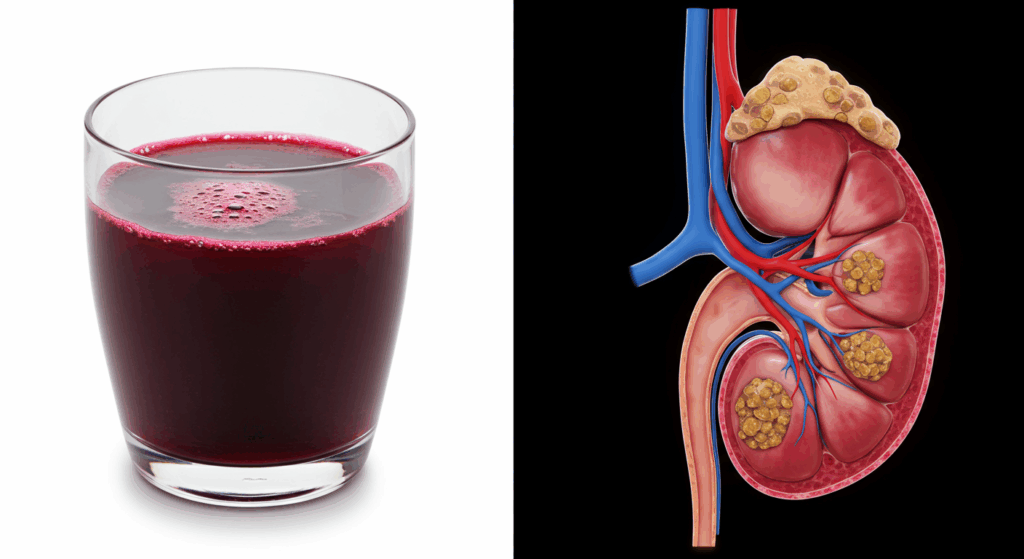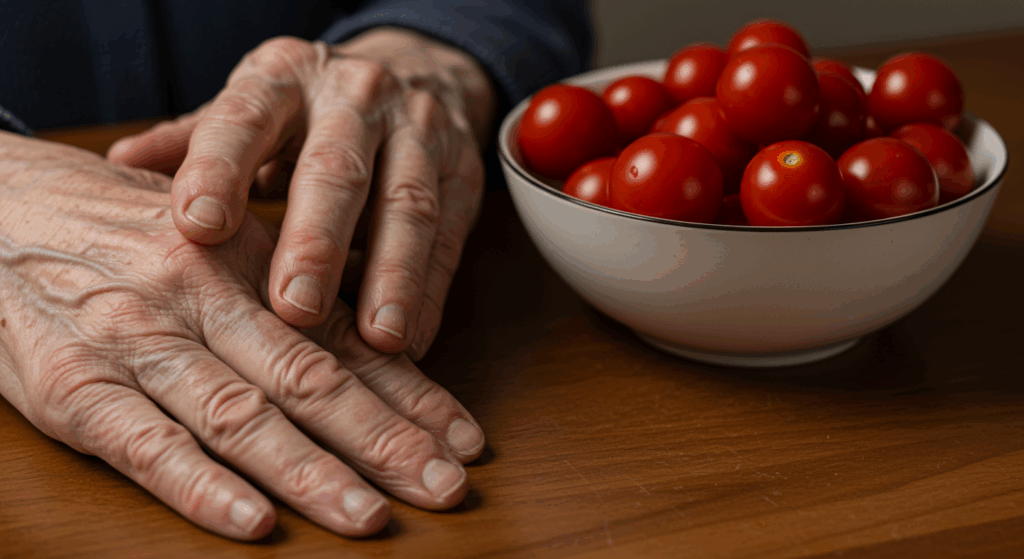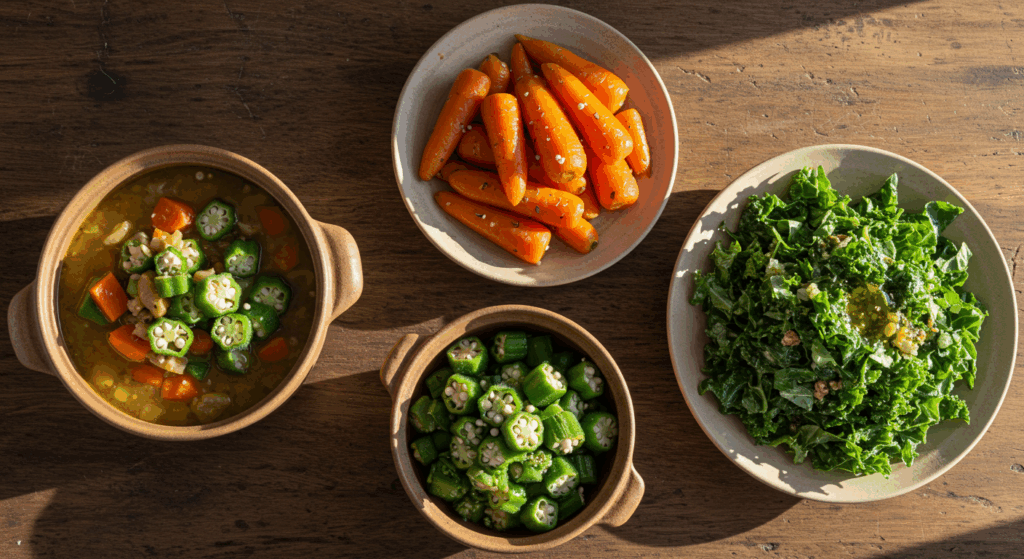They say eating vegetables is always good for your health. But what if I told you that for seniors over 60, that’s not the whole truth? Some vegetables, often praised as “superfoods,” can quietly raise your high blood pressure, weaken your legs, make you dizzy, or even trigger a stroke.
My name is Harold, and I’m 76. I learned this the hard way after a sudden spike in blood pressure landed me in the hospital. The most shocking part wasn’t the near-death experience; it was realizing the “healthy” vegetables I ate every day were part of the problem.
The reason is simple: our bodies change dramatically after 60. Our blood vessels become more fragile, our kidneys work more slowly, and our reaction to certain plant compounds is no longer the same. Most nutrition advice isn’t written for us. This article is your guide to navigating the vegetable aisle safely. I’ll show you the 4 vegetables you should avoid to maintain healthy blood pressure control, and the 4 you should eat daily to strengthen your arteries and protect your heart. This isn’t just my story; it’s a science-backed warning and an invitation to reclaim your heart health.
4 Vegetables to Avoid for High Blood Pressure and Heart Health After 60
Have you ever had a day where you ate carefully—no salty or fried foods—yet your blood pressure still spiked? The culprit might not be the usual suspects. It could be the steamed vegetables sitting quietly on your dinner plate. For seniors over 60, the body’s detoxification system, especially the kidneys and liver, slows down. This means certain compounds in seemingly healthy vegetables can build up, putting dangerous pressure on your heart and arteries. Here are the four you need to watch out for.
1. Spinach: The “Superfood” with a Hidden Risk
Spinach is universally praised for its iron, calcium, and vitamins. However, it contains extremely high levels of oxalates. Oxalates are natural compounds that can block calcium absorption and, more critically for seniors over 60, accumulate into painful kidney stones.
- The Problem: When your kidneys are already working more slowly, filtering high amounts of oxalates becomes a heavy burden. This can lead to kidney damage and inflammation, which directly contributes to high blood pressure. If you frequently drink raw spinach smoothies or juices, your body may be getting an oxalate overload it can no longer handle.
- A Real Story: Be mindful of early warning signs like vague back pain, painful urination, or persistent fatigue after meals. These could be your body signaling that this “superfood” isn’t super for you. The risk of poor blood pressure control linked to kidney strain is a serious concern.
2. Beets: The Double-Edged Sword
Many people turn to beet juice to lower blood pressure, thanks to its natural nitrates that help relax blood vessels. But for anyone with a history of kidney stones or reduced kidney function—a common issue in aging—beets are a ticking time bomb.
- The Problem: Just like spinach, beets are exceptionally high in oxalates. A single glass of beet juice can push your oxalate levels beyond what your aging kidneys can safely process. This can lead to urinary tract inflammation, back pain, swelling, and, ironically, a spike in high blood pressure as your body struggles.
- A Real Story: Mr. Lisa, 68, shared that he drank a glass of beet juice every morning to “boost his blood.” Four months later, he was hospitalized with a large kidney stone blocking his urinary tract, a direct consequence of his seemingly healthy habit. This shows how crucial personalized healthy eating for seniors is, as a general recommendation can pose a significant stroke risk.
3. Tomatoes: The Inflammatory Nightshade
Tomatoes are a staple in kitchens across America. They seem harmless, but if you’re over 60 and managing high blood pressure, arthritis, or neuropathy, they may be doing more harm than good.
- The Problem: Tomatoes belong to the nightshade family, which contains a compound called solanine. Solanine is the plant’s natural defense chemical, but in sensitive humans, it can trigger inflammation, irritate the gut, and interfere with nerve signals. For seniors whose systems are already more sensitive, this inflammation can put extra stress on blood vessels and disrupt blood pressure control.
- A Real Story: Linda, a 73-year-old from Florida, struggled with joint stiffness and unpredictable blood pressure spikes despite eating daily garden salads topped with cherry tomatoes. On her doctor’s advice, she cut out nightshades. Within 10 days, her joint pain subsided and her blood pressure readings stabilized. When she added tomatoes back, the symptoms returned. Science confirms that solanine can disrupt acetylcholine signaling, increasing the risk of high blood pressure in older adults.
4. Potatoes: The Blood Sugar Spiker
Potatoes are the ultimate comfort food, but they hide a secret that’s particularly dangerous for heart health after 60. They possess one of the highest glycemic loads of any vegetable.
- The Problem: A high glycemic load means potatoes cause your blood sugar to spike rapidly. This triggers a large insulin release, which in turn can lead to increased water retention and sodium retention in the body. This combination puts direct, immediate pressure on your blood vessels, which is exactly what you want to avoid when you have high blood pressure.
- A Real Story: Charles, a 68-year-old retired electrician, thought he was making a healthy choice by swapping fries for a baked potato every night. Over time, he felt sluggish, noticed his ankles swelling, and his blood pressure kept creeping up. His doctor confirmed he was pre-diabetic. The daily blood sugar spike from the potatoes was contributing to both his pre-diabetes and his worsening hypertension. Harvard research confirms that daily potato consumption significantly raises the risk of type 2 diabetes, a condition closely linked to artery damage and heart disease.
4 Vegetables to Embrace for Better Blood Pressure Control and Heart Health
Now for the good news. Just as some vegetables can be problematic, others are powerful allies in your journey for better heart health. These vegetables work to lower inflammation, support healthy blood flow, and strengthen your heart from the inside out.
1. Broccoli: The Guardian of Your Blood Vessels
Broccoli might seem ordinary, but it’s a powerhouse for seniors over 60. It belongs to the cruciferous family of vegetables, which have been scientifically shown to support aging blood vessels.
- The Science: A study in BMC Medicine found that adults over 60 with elevated blood pressure who consumed broccoli-based soups saw their systolic blood pressure drop by an average of 2.4 mmHg. That small drop translates to a 5% lower risk of heart attack or stroke! The British Heart Foundation endorses cruciferous vegetables as one of the easiest ways to reduce pressure on aging arteries.
- A Real Story: My friend Mark, 69, found himself getting breathless and shaky during his short daily walks. I told him what my cardiologist told me: broccoli quietly supports aging blood vessels. He started having broccoli soup every night. Two weeks later, he called to say his legs felt steady and his heartbeat was calm. That’s the freedom that comes with the right food choices for blood pressure control.
2. Kale: The Soother of Nighttime Aches
Kale’s bitter taste and chewy texture might put some people off, but this humble leaf is one of the best silent protectors for anyone with high blood pressure.
- The Science: According to the National Institutes of Health, kale is incredibly rich in potassium, which is crucial for neutralizing excess sodium in the body—a key driver of hypertension. It’s also packed with Vitamin K and Vitamin C, which protect blood vessel walls, reduce inflammation, and keep arteries flexible.
- A Real Story: Linda, 75, was suffering from nighttime leg cramps and numbness that ruined her sleep. She started adding sautéed kale to her morning toast. Three weeks later, her feet no longer woke her up at night. She felt rested and could walk up the stairs without even touching the handrail. This is a perfect example of how targeted healthy eating for seniors can restore a sense of normalcy and control.
3. Okra: The Blood Sugar Stabilizer
Not all heart-protecting foods make headlines. Some, like okra, are quiet heroes. For managing the trifecta of blood sugar, cholesterol, and blood pressure, okra is an invaluable ally.
- The Science: The journal Frontiers in Nutrition confirms that multiple studies show okra reduces HbA1c, fasting blood sugar, and LDL (“bad”) cholesterol. It contains a unique gel-like fiber called mucilage that stabilizes blood sugar, while its polyphenols reduce inflammation and protect the delicate lining of your blood vessels.
- A Real Story: James, a 70-year-old retiree, was worried about his recent diagnosis of mild diabetes and rising blood pressure. He started adding okra to his evening soup. Three weeks later, he played a full round of golf without shortness of breath. He calls okra his “silent teammate,” a food that nourishes his heart consistently and quietly, improving his overall heart health.
4. Carrots: The Artery Repairer
Often overlooked, the humble carrot is a fantastic tool for reinforcing your circulatory system.
- The Science: Carrots are loaded with beta-carotene, a plant-based form of Vitamin A. This powerful antioxidant is essential for producing collagen, which is the structural protein that keeps your blood vessels strong and flexible. It also fights oxidative stress, which is a major contributor to artery damage and high blood pressure.
- How to Use: Steaming carrots lightly makes them tender and sweet while preserving their nutrients. They are the perfect addition to a heart-healthy meal, working to repair and protect your arteries from the inside out.
Putting It All Together: The 10-Minute “Blood Pressure Dinner” Formula.
Knowledge is only powerful when applied. The simplest way I found to incorporate these lessons was by creating a simple, repeatable dinner ritual. I call it my “Blood Pressure Dinner.”
It consists of three parts:
- A bowl of Okra Soup: To stabilize blood sugar and cholesterol.
- Steamed Carrots: To repair and strengthen blood vessels.
- A Kale Salad (tossed in olive oil): To protect arteries and balance sodium with potassium.
This simple meal—okra to stabilize, carrots to repair, and kale to protect—is more than just food. It’s a powerful, daily ritual that provides your body with the exact tools it needs to manage high blood pressure and support long-term heart health. It’s fuel for your independence.
Conclusion: Small, Consistent Actions Create Lasting Health
Managing your health after 60 isn’t about drastic diets or a new prescription. It’s about understanding that your body has new rules. It’s about making small, informed choices, like swapping a potato for broccoli or adding kale to your breakfast.
We’ve covered the 4 vegetables to limit if you have high blood pressure (spinach, beets, tomatoes, potatoes) and the 4 to embrace for a healthier heart (broccoli, kale, okra, carrots). True health doesn’t live in knowledge alone—it lives in the small, consistent actions you take every single day. One healthy dinner at a time.
If you found this guide helpful and want a printable PDF of the 4 best and worst vegetables, plus a 7-day heart-friendly meal plan, leave a comment below with the word “DINNER”! Let’s keep learning and supporting each other on this journey.


















Leave a Reply